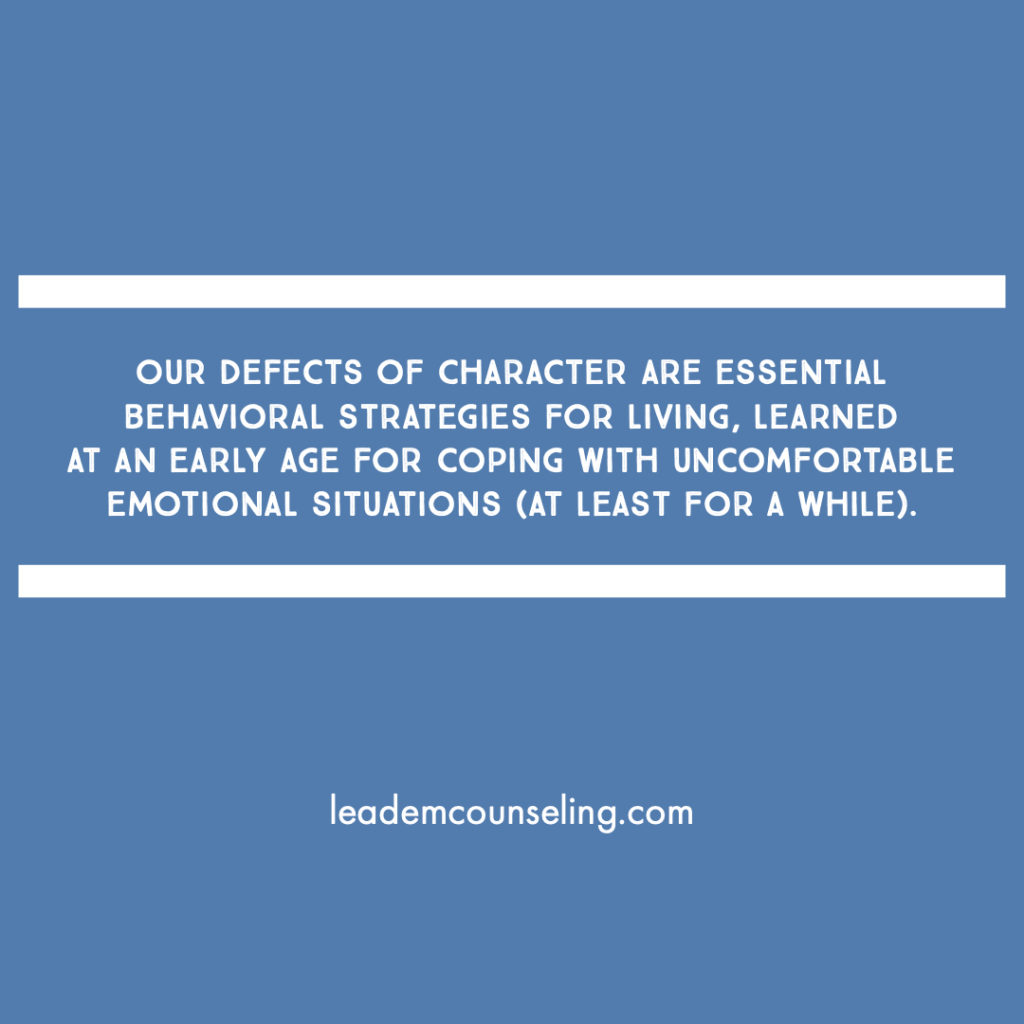Exploring the Role Defects of Character Play in a Relapse Process
We are glad you have returned for Part 3 which is intended to answer the question, “What is in it for me?”
Most dictionaries define a defect as a “failing, blemish, or flaw, especially one that still allows the affected thing to function, however imperfectly.” A flaw in one’s character warrants particular attention because it still allows the affected person to function; this is a definition that raises more questions.
Does the author of that definition mean that human failing is considered a defect because, in spite of the character defect, that person is still able to function? Or does it mean that the person is able to function because of the brokenness or defect of character? We hold that both interpretations are accurate. Our defects of character once allowed us to function, and now we manage to function in spite of them. Some of us will question whether or not we can even live without them.
Our defects of character are essential behavioral strategies for living, learned at an early age for coping with uncomfortable emotional situations (at least for a while). To illustrate this point, imagine a child growing up in an emotionally charged family environment of active alcoholism. In such a family system, it is likely to find hurt people hurting other people. The people might hurt each other, people outside of the family, or they may simply deny that they are being hurt at all while they withdraw themselves from harm’s way through a variety of avoidant behaviors. The child who is feeling neglected or abandoned might develop a pattern of behaviors that have, at their core, the child’s protest that he or she does not need them or anyone for that matter.
Those patterns of behavior might include isolationism, escapism, or the mistreatment of those who might profess to care about him or her. These patterns of behavior, which began as a way of coping with life’s discomforts or unhappiness, will be known as defects of character later in adult life. The child is not thinking about the future impact of such ideas or behaviors, only that the behavior, whatever the description, eases the pain of living. The defects of character in this illustration allow the young child to function. Without the pain-reducing effect of these behaviors, life might be intolerable. The child, unfortunately, does not understand that the pain is not gone, just masked.
When the same child matures and is faced with the demands of adult relationships, the patterns of behavior used in the illustration of isolationism or escapism are no longer effective methods for coping with pain. The defects and their behaviors once relieved pain, but now it can cause pain. The adult escapist runs from intimate and committed relationships as if his or her life was in danger and, in so doing, hurts others and him or herself. The prospective partners that he or she leaves hanging feel rejected and blame themselves for not being enough to keep a partner. The escapist is hurt because he or she is once again deprived of the opportunity to know true intimacy. He or she does not want to run. He or she only knows that he or she has survived in life by not relying on anyone for anything. The prospect of trusting others leaves him or her feeling anxious and the old pattern of sabotaging romantic entanglements begins, oftentimes, without his or her ever being aware of it. He or she feels alone and trapped.
Those of us in recovery from addictive illnesses have known the feeling of being trapped in our problematic behavioral patterns. We are not unique as recovering people, for every person has adopted ways of coping with life that might appear to others to be maladaptive or problematic. For those in the general population, these coping strategies are rarely ever seen as defects of character that need to be changed. Most people validate the unwanted behaviors associated with a particular defect of character as if those behaviors were parts of the personalities with which they were born. How many times have you had someone keep you at bay by saying, “This is who I am. If you want more,you are going to have to go elsewhere.” Although science may prove us wrong, we do not believe that we are born with personality flaws. We believe our personalities are shaped by the life experiences we engage in or those to which we are subjected. In fact, we believe that these so-called flaws or defects were, in many instances, strengths at one point. If these defects were important coping skills in the past, then why must they be removed? What happened?
The defects in our character must be removed because the person we were will relapse again. The road to relapse into harmful behaviors of any of the addictive dependencies is paved by our defects of character. If we relapse, it will happen for only one reason: we will want to feel different, and we will choose any means available to us to obtain that desired feeling of change. For the person who is dependent on substances such as the alcoholic, substance-dependent person, or food addict, it will mean a return to their “drug” of choice or the use of some other equally addictive substance or behavior. The love and sex addict, the compulsive gambler, the co-dependent, etc. will be drawn back to the destructive behaviors of their respective dependencies. When the defects in our character no longer dull the pain or fear of living, many of our fellows are drawn back into active addiction.
Long before any of us ever consumed an addictive substance or initiated any addictive behaviors, we experimented with behavior strategies for changing our moods. Those behavior strategies, as described earlier, became ways of coping with uncomfortable feelings associated with uncomfortable situations. These coping strategies would fail from time to time to relieve our emotional discomfort and we would bolster their pain-dulling power by using addictive substances or addictive behaviors. Once an addictive dependency set in, our defects of character would seem to be forever linked with our addictive cycles. It seems that they are imprinted on an emotional template for how to cope with people and situations. They seemed to strengthen each other like combining addictive substances or addictive mood changing behaviors. The result was devastating.
In the early periods of our recovery, many of our life improvements seemed to come easily because there was an immediate relief when we eliminated the addictive substances or abstained from the worst of our addictive behaviors. Many in recovery believe that the release from the hell of active addiction that they were granted was a pardon. The belief that we have been pardoned will lure us into the assumption that we can resume the life we had been living before addiction, as if the debt has been forgiven. We have received only a daily reprieve contingent on the maintenance of our spiritual condition (Alcoholics Anonymous, (1953), p. 79), and not a pardon. A reprieve delays payment on a debt. It does not forgive the debt the way a pardon does. We have been relieved of the obsession to use substances or to behave addictively, but those shackles will reappear if we fail to work on the defects in our character. Those defects can and will be removed in the 7thStep[1] if we take pains to do so; however, they will return if our self-will begins to run riot.
Living life on life’s terms means coping with discomfort without the benefit of our addictive behaviors or substances. When we are not using addictive behaviors or substances, we have found that our defects of character will intensify and produce behavioral profiles sometimes referred to as “dry drunks.” If the “dry drunks” are not stopped by the intervention of our defects of character, the result can be a “wet drunk” or the return to ruinous behavior.
This is not, by any means, a hopeless picture because the Twelve Steps offer a proven method for breaking the grip of addiction and generating major personality change. If our Step work includes a thorough completion of the 6th[1] and 7th Steps, the road of recovery, however rocky, will be a journey that will bring us enduring peace.
In summary, our defects of character are not the products of an evil curse or an irreparable flaw in our character. We were not broken at conception and doomed to stumble and fall repeatedly. Our defects of character contain behaviors that once allowed us to function in threatening and unpredictable environments and, as such, were tools for survival. Those survival tools or coping strategies were adaptations to our personality that allowed us to cope with the stress of living. Steps 6 and 7 offer us a way to make true personality changes that make our recovery worth the effort. Do not stop the journey until the miracle of emotional sobriety is yours. If the forgotten steps remain forgotten, you will miss out on the prize.
Please join us for the next article in the series which outlines the journey that will bring about the discovery of your defects of character and provide insights into what you can do about them.
About the Authors

Both John and Shawn Leadem are Licensed Clinical Social Workers in private practice in Toms River, New Jersey.
John has recently celebrated his 48th year in recovery and believes that “service to others is the cornerstone of spiritual maturity.” His professional service to addicted individuals and their families has included the development and direction of addiction treatment services in a full array of modalities from half-way houses to large residential treatment facilities over the past 45 years.
Shawn’s lifelong exposure to the recovery culture and his personal recovery experience has left him with a deep personal empathy for the social and emotional suffering endured by others and a strong faith in a person’s ability to change. He has received his certification as a Sexual Addiction Therapist and as a Multiple Addictions Therapist by the International Institute for Trauma & Addiction Professionals.
Together, John and Shawn have co-authored and brought their unique treatment model of relapse prevention, An Ounce of Prevention: A Course in Relapse Prevention, to residential treatment centers across the United States, they have trained therapists at numerous national and international conferences, and most recently have trained many EAP programs associated with many State Unions.
Footnotes
[1] Alcoholics Anonymous. (2001). Alcoholics Anonymous, 4th Edition. New York: A.A. World Services.
The Steps
- We admitted that we were powerless over alcohol- that our lives had become unmanageable.
- Came to believe that a Power greater than ourselves could restore us to sanity.
- Made a decision to turn our will and our lives over to the care of God as we understood Him.
- Made a searching and fearless moral inventory of ourselves.
- Admitted to God, to ourselves, and to another human being the exact nature of our wrongs.
- Were entirely ready to have God remove all these defects of character.
- Humbly asked Him to remove our shortcomings.
- Made a list of all persons we had harmed, and became willing to make amends to them all.
- Made direct amends to such people wherever possible, except when to do so would injure them or others.
- Continued to take personal inventory and when we were wrong promptly admitted it.
- Sought through prayer and meditation to improve our conscious contact with God as we understood Him, praying only for knowledge of His will for us and the power to carry that out.
- Having had a spiritual awakening as the result of these steps, we tried to carry this message to alcoholics, and to practice these principles in all our affairs.
Copyright, John Leadem & Shawn Leadem, 2019
You are free to copy this article for future reference, to post it on other web sites and to share it with family or friends. If you would like to have permission to include it in a publication of your own you can request written permission by contacting the authors at www.leademcounseling.com.
[apss-share networks="facebook, twitter, google-plus, pinterest, linkedin" counter="0" total_counter="0" http_count="1"]











2 Comments | Post Comment
I feel that you are speaking directly to me. Thank you.
I have had the opportunity to work with many folks struggling to recover from or avoid relapse over the past 49 years; however, it was really written about me and what I would need to change in order to remain sober. I am thrilled that is if of benefit to you.
Leave a comment